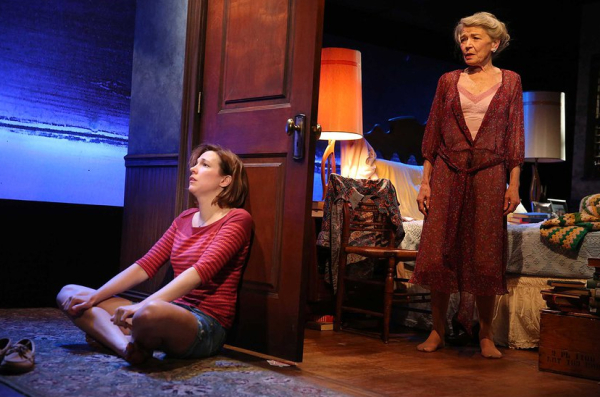Too Much, Too Much, Too Many
Young playwright Meghan Kennedy contributes an understated portrait of love and loss to Roundabout Underground’s seventh season.

(© Joan Marcus)
If you listen closely to Meghan Kennedy’s poetic dialogue, you might be able to decode the ambiguous title she has given to her new play, Too Much, Too Much, Too Many, the newest resident of Roundabout Theatre Company’s Black Box Theatre. Though you may assume that an evening of excess awaits, Kennedy’s writing is the picture of restraint, subtly delving into the complex world of love, loss, and grief.
Plot takes a backseat to character study in this short, 70-minute piece, poignantly directed by Sheryl Kaller. Kennedy puts a magnifying glass up to the lives of her four characters as each one grieves different personal losses within the suffocating confines of a small country home. The recently widowed Rose (played by Phyllis Somerville) expresses her grief most evidently, locking herself in a tiny bedroom for over the six months following her husband’s death. Melodramatic though that may sound, Somerville paints a picture of a woman far more interested in solitary reflection than emotional theatrics. She captures the heavy quietness that grief carries with it while still exuding a strength and sharp-tongued wit that have survived her husband’s passing.
Even locked behind a heavy wooden door, Rose remains a maternal authority figure, though her last remaining unmarried child has assumed the responsibility of caring for her. Rebecca Henderson offers a standout performance as the almost-40-year-old daughter, Emma. She manages to show glimmers of her own feelings of loss through the cracks in her own thick protective shield, which seems to offer an even stronger emotional barrier than her mother’s bedroom door. As she conjures ghostlike memories of her charismatic father and his gradually declining health (heartbreakingly portrayed by James Rebhorn), we see how Emma’s grief has led her to become a recluse herself. Kaller directs these flashbacks with seamless cinematic effect, weaving the past into the present to show the origins of the emotional and physical cage in which this dutiful daughter now finds herself.
Emma’s life extends only the short distance from the kitchen to her mother’s bedroom door. She stoically roams this singular, unchanging set (designed by Wilson Chin) as she spends her days hoping to coax her mother out of her room by perfecting her famous muffin- and sweet-potato-pie recipes. Yet, the nights always end the same with Rose’s request for Emma to ritualistically recite a description of her father’s body as it was found immediately following his death.
The tall, handsome Pastor Hidge (the commanding yet charming Luke Kirby), who claims to have been sent to them by their local church, attempts to lift some of Emma’s burden by making regular house calls. He sits by Rose’s bedroom door reading Bible passages, playing cards, and even “dancing” with her to lure her outside; though more often than not, Rose sits silently on the other side of her thick wooden barrier. Meanwhile, Pastor Hidge and Emma develop a romantic spark that begins to pry open both of their hermetically sealed hearts.
However, the play’s primary love story remains between Rose and her late husband. Somerville delivers a handful of beautifully poetic monologues, which she recites like spoken love letters, conjuring images of a romance that seems to have bordered on the divine. True — the realities of love, and especially marriage, are never this majestic. However, as Kennedy touchingly communicates, memories of them are often lifted to these great heights. Rose and her husband’s physical incarnation (Rebhorn) interact in the course of the play only once, keeping their romance an unfathomable myth, the loss of which only Rose can understand.
Even without large plot twists or a barrage of dramatic fireworks, Kennedy tells a deeply heartfelt and compelling story about loss and the powerful fallout that ensues. Kaller strikes just the right tone for the subject matter, allowing this power to organically emerge out of the uneasy quiet that consumes most of the play. For as the riddle in Kennedy’s title illustrates, it is often not words themselves but the silences between them that speak the loudest.










